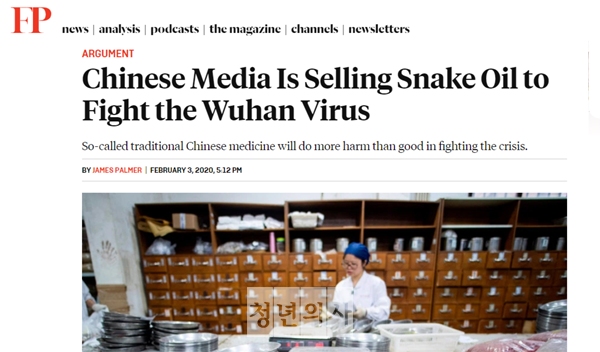A U.S. magazine criticized traditional Chinese medicine for undermining efforts to prevent the spread of the novel coronavirus (2019-nCoV) within China.
The Foreign Policy on Monday published an article, saying traditional Chinese medicine was doing more harm than good in fighting the crisis. It slammed the Chinese state media Xinhua for promoting “pseudoscience” to the public and exacerbating the confusion. (Link to the article: Chinese Media Is Selling Snake Oil to Fight the Wuhan Virus)

The magazine reported that Xinhua advised concerned people to try Shuanghuanglian, an oral remedy, backing up the claim with a study by the Shanghai Institute of Meteria Medica and the Wuhan Institute of Virology.
After the news report, Shuanghuanglian sold out across the country. Composed of honeysuckle flowers, Chinese skullcap, and forsythia, Shuanghuanglian is known to be effective for fever, cough, and sore throat.
However, the Chinese news report came under fire, and the popular medical information site, dxy.cn, denied the claim for Shuanghuanglian’s efficacy. Pressured by growing criticism, other state media outlets began to play down the Xinhua’s report.
“Shuanghuanglian was invented in the 1960s, based on a mixture of the fictional humoral theories that underpin pre-modern Chinese medical theories and the herbology accumulated by Chinese medical practitioners over centuries,” the Foreign Policy said. “As with most such practices, the clinical evidence is highly inconclusive. There is no evidence it can achieve success in the treatment of bacterial and viral infections, especially at scale.”
The magazine went on to say that clinical standards of traditional Chinese medicine were unclear, and data faking was common. It cited a study published in 1998 to note that 99 percent of papers in conventional Chinese medicine reported positive outcomes, which was statistically impossible.
“For poor Chinese unable to afford hospital treatment or afraid of being snatched up into quarantine, home remedies may be the only options available. But spurious herbs and imaginary theories can only harm the attempts to battle a virus that needs a scientific answer, not a politicalized pseudoscience,” the magazine said.
Oriental medicine practitioners promote Shuanghuanglian as a preventive drug for Wuhan virus
Some Korean Oriental medicine practitioners are promoting Shuanghuanglian for the treatment of the new coronavirus. An over-the-counter medication containing Shuanghuanglian is also available in the market.
An Oriental medicine practitioner said the Oriental medicine community should join efforts to prevent the spread of the new coronavirus on a blog of an Oriental medicine clinic. “A study found that Shuanghuanglian could control the novel coronavirus. Because of the findings, this drug is running out of stock,” he said.
He claimed that the drug was studied for the treatment of acute upper respiratory tract infections and that it was the most commonly prescribed drug for cold in China.
During the SARS (Severe Acute Respiratory Syndrome) outbreak in 2002-2003, WHO statistics showed that China’s Guangdong Province used Shuanghuanglian more actively and recorded a significantly low mortality rate compared to other regions of the country, he claimed.
Another Oriental medicine practitioner said on his blog that the novel coronavirus outbreak would be contained by Oriental medicine. “I am preparing herbal medicine to prevent the new coronavirus in advance and prescribing reimbursable and non-reimbursable medicines to patients,” the practitioner said.
The Association of Korean Medicine (AKOM), a group of Oriental medicine practitioners, demanded state support for combining Western medicine with traditional Korean medicine to treat and prevent the new coronavirus.
AKOM President Choi Hyuk-yong said in a news conference on Jan. 29 that Oriental medicine practitioners should directly see the confirmed and suspected patients and establish treatment guidelines.
To do so, AKOM needs aggressive support from the government, Choi emphasized.

